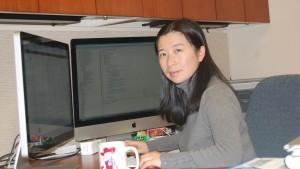Fourteen years ago, Yi Liu began her doctoral program in the Department of Computer and Information Science at the University of Mississippi. Her research was in software engineering, particularly component-oriented programming.
After four years, she graduated and began working as an assistant professor at the South Dakota State University. Promoted to associate professor, she continues to conduct research and teach in software engineering.
Recently, Liu returned to UM as one of two Ph.D. alumni seminar speakers. Her topic was “EASTWeb Framework: A Plug-In Framework for Constructing Geospatial Health Applications.” While on campus, she met with several faculty members about shared interests and possible collaboration, and with a group of doctoral and master’s students.
“Dr. (H. Conrad) Cunningham was my dissertation advisor when I was pursuing my Ph.D. degree,” said Liu, who earned her master’s degree from Nanjing University, one of the top six institutions in the People’s Republic of China. “I took Software Engineering II, Component Software and Software Architecture from him. I also worked on research projects including the dissertation research under his supervision. The courses and the research built the foundations for my career after graduation.”
Before following her husband, who was already at UM as a doctoral student in chemistry, Liu taught a couple of years at Soochow University in her hometown of Suzhou, China.
Liu is fondly remembered by her Ole Miss computer science professors.
“In my 26 years on the faculty, she is the graduate student with whom I have most enjoyed working and who has benefited from my research program the most,” said Conrad Cunningham, chair emeritus and professor of computer and information science. “She is also a good friend. Of the Ph.D. graduates who have joined a CS faculty after graduation, she has probably been the most successful in terms of both teaching and research.”
Dawn Wilkins, chair and professor of computer and information science, served as one of Liu’s doctoral committee members.
“Dr. Liu is one of the most inventive doctoral students I have ever encountered,” Wilkins said. “Her ability to build upon the foundations of basic software design is impressive.”
Liu shares reciprocal memories of her professors.
“I took several graduate classes from Dr. Wilkins, including Machine Learning, Advanced Algorithms,” she said. “I liked her teaching style and enjoyed all of the classes I took from her.”
Honors and awards Liu received while at Ole Miss include the SAP Scholarship, summer graduate research assistantship, Academic Achievement Award in Ph.D. Program in Engineering Science and Graduate School Dissertation Fellowship.
“I have been a member of the computer science honor society Upsilon Pi Epsilon since 2002 and served as epsilon (secretary) for the UM Chapter,” Liu said. “The experience of being a member and officer of UPE helped me a lot to start a new UPE chapter and serve as the faculty adviser at South Dakota State University nine years later.”
Liu’s active research grants include the Epidemiological Applications of Spatial Technologies Framework, an open-source, client-based software developed to automate the retrieval, processing and storage of satellite remote sensing data for public health research and applications. She is a co-principal investigator in the development of an integrated system for the epidemiological application of earth observation technologies, including the EPIDEMIA system, Framework for developing Web-Atlas applications and semantic-based image retrieving system.
Liu has also created a crash-mapping automation tool software application, a remote sensing and precision agriculture application, intelligent software components, a new component-oriented software engineering course and BoxScript, a component-oriented language.
A prolific author, she has co-written six journal articles, a book chapter and 22 conference papers. Liu has served on the technical program committee for a workshop and two conferences and been a reviewer for conference papers and journals.
“The computer science program at UM may not have been big, but it had a decent teacher-graduate student ratio so that the graduate students were under good supervision,” Liu said. “I was working on the research topics I was interested in and enjoyed my study and research at the program.”
